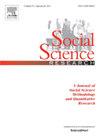Crimmigration and the punishment of women: Evidence from Texas courts
IF 3.5
2区 社会学
Q1 SOCIOLOGY
引用次数: 0
Abstract
Recent research argues that the criminalization of immigration reflects broader social processes of membership and belonging, making some noncitizens deportable and others worthy of protection. Yet, while scholars suggest that both immigration and punishment are gendered, limited research scrutinizes gendered crimmigration on a large scale or explores how it operates in state courts. Using comprehensive data on all arrests in Texas from 2006 to 2018, I examine the role of gender, citizenship status, legal status, and race/ethnicity in the likelihood of being charged, convicted, and sentenced to incarceration among similarly situated defendants. Results indicate that in Texas courts, citizenship and legal status operate differently across gender categories. Among men, noncitizen status serves as a penalty in case processing, but women noncitizens, on average, receive leniency and have lower likelihood of conviction and incarceration than citizen women counterparts. I find that this result is largely driven by leniency for legal noncitizen women arrested for misdemeanor offenses. Undocumented women, however, receive a penalty relative to citizen women for felony offenses. I also find that among noncitizen defendants, Hispanic and white noncitizen men fare the worst in criminal case processing. These findings suggest both gendered and ethnoracialized pathways of noncitizen punishment.
犯罪、移民和对妇女的惩罚:来自德克萨斯州法院的证据
最近的研究认为,对移民的定罪反映了更广泛的社会成员和归属过程,使一些非公民被驱逐出境,而另一些人值得保护。然而,虽然学者们认为移民和惩罚都是性别的,但有限的研究对大规模的性别犯罪移民进行了仔细审查,或探讨了它在州法院的运作方式。利用2006年至2018年德克萨斯州所有逮捕的综合数据,我研究了性别、公民身份、法律地位和种族/民族在被指控、定罪和被判处监禁的可能性中的作用。结果表明,在德克萨斯州的法院,不同性别的公民身份和法律地位的运作方式不同。在男性中,非公民身份在案件处理中被视为惩罚,但非公民女性平均得到宽大处理,定罪和监禁的可能性低于女性公民。我发现,这一结果很大程度上是由于对因轻罪被捕的合法非公民女性的宽大处理。然而,无证妇女因重罪而受到的处罚相对于公民妇女。我还发现,在非公民被告中,西班牙裔和白人非公民男性在刑事案件处理中表现最差。这些发现表明了非公民惩罚的性别和种族化途径。
本文章由计算机程序翻译,如有差异,请以英文原文为准。
求助全文
约1分钟内获得全文
求助全文
来源期刊

Social Science Research
SOCIOLOGY-
CiteScore
4.30
自引率
4.00%
发文量
0
审稿时长
65 days
期刊介绍:
Social Science Research publishes papers devoted to quantitative social science research and methodology. The journal features articles that illustrate the use of quantitative methods in the empirical solution of substantive problems, and emphasizes those concerned with issues or methods that cut across traditional disciplinary lines. Special attention is given to methods that have been used by only one particular social science discipline, but that may have application to a broader range of areas.
 求助内容:
求助内容: 应助结果提醒方式:
应助结果提醒方式:


